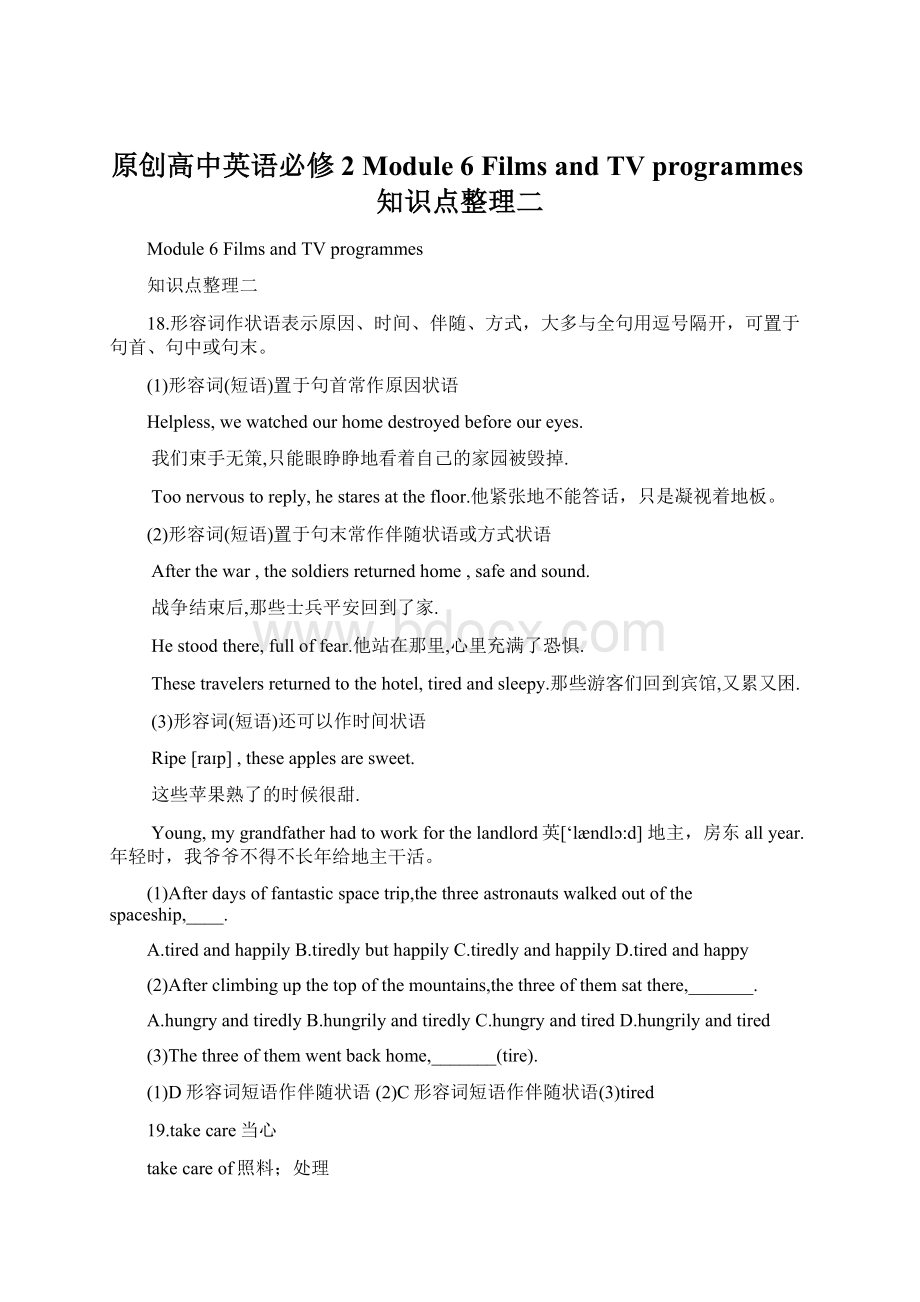原创高中英语必修2 Module 6 Films and TV programmes知识点整理二文档格式.docx
《原创高中英语必修2 Module 6 Films and TV programmes知识点整理二文档格式.docx》由会员分享,可在线阅读,更多相关《原创高中英语必修2 Module 6 Films and TV programmes知识点整理二文档格式.docx(31页珍藏版)》请在冰豆网上搜索。

处理
underthecareof…在……的照料下;
在……的保护下
withcare小心;
慎重
carefor喜欢;
照顾
careabout关心;
介意;
在乎
Einsteinwhocaredlittleformoneynevercaredabouthissalary.
爱因斯坦对金钱不感兴趣,他从不在乎薪水多少。
Doyoucareaboutpolitics?
你关心政治吗?
(1)—Wouldyou___agameoftabletennis,Cathy?
—I’dloveto,butIstillhavepilesofhomeworktodo.
A.careforB.careaboutC.caretoD.takecareof
(2)Whenhismotherdied,Allandidn’tseemto____itatall.
A.careB.careaboutC.careforD.caringabout
(3)Brave,goodandstrong,Xiulianisthecharacterwecare________most.(填介词)
(1)Acareto后接动词原形
(2)B(3)about
20.playthepartof…=playtheroleof…扮演……角色
Sherefusestoplaythepartoftheadoring[ə’dɔ:
rɪŋ]崇拜的,敬慕的wife.
她拒绝扮演贵妇人这一角色。
playapartin…=playarolein…在……中起作用;
在……中扮演角色
Hewouldnotliketoplayapartinthishistoricprocess.
他不愿意在这一历史进程中扮演角色。
playanimportantpartin…=playanimportantrolein…在……中起重要作用;
在……中
扮演重要的角色
Hehasplayedanimportantpartinthewholeplan.
他在整个计划中扮演了重要的角色。
(1)Wefirsthavetodecidewhichroleeachgroupmembersshould____intheacting.
A.takeB.makeC.playD.use
(2)BeautifulZhangZiyiplaysthepart_____YuJiaolong.(填介词)
(1)C(3)of
21.occasional[ə’keɪʒənl]adj偶然的;
非经常的;
特殊场合的
occasionally[ə’keɪʒnəli]adv偶尔;
有时
Hevisitsmeoccasionally.
occasion[ə'
keɪʒn]n场合;
时机;
机会
onoccasion有时,间或
Iwentswimmingonoccasioninsummer.夏天我有时去游泳。
ononeoccasion曾经;
有一个时候
Ononeoccasion,shewasrobbedwhenshewenthomelatefromtheoffice.
她有一次很晚从公司回家时遭到了抢劫。
ontheoccasionof…在……的时候;
值……之际
Ontheoccasionofthereopeningceremony,werequestthehonourofyourpresence[‘prezns].
值此重新开张之际,我们敬请各位光临.
(1)—Youdon’tgotothatsupermarketquiteoften,doyou?
—No,Ionlygothere___becauseit’stoofarawayfrommyhouse.
A.eventuallyB.constantlyC.occasionallyD.frequently
(2)Heisagoodstudentexceptthatheis____careless.
A.occasionalB.occasionallyC.oftenD.usually
(3)Hedoesn’talwayscallmeup;
heonlycallsme____________(occasion).
(1)C.
(2)B(3)occasionally
22.entertaining[entə’teɪnɪŋ]adj有趣的,令人愉快的
IhadanentertainingeveninginBeijing.
entertainv使娱乐,使快乐;
招待,款待
entertainsbwithsth用某事/物使某人快乐;
用某物招待/款待某人
Heentertainusforhourswithhisstoriesandjokes.
他讲故事、说笑话,让我们高兴了好几个小时。
entertainment娱乐,文娱节目;
Youngpeopleoftenspendsalotofmoneyonentertainment.
findanentertainmentin以……为乐
Hefoundanentertainmentinreadingalldaylong.他整天以读书为乐
entertainer[entə’teɪnə(r)]表演者;
艺人;
款待者
Heisagreatfilmentertainerwithmanyfans.他是一个有很多影迷的艺人。
(1)Booksofferexcellent___forfreehours.
A.enjoymentB.appreciationC.entertainmentD.reputation
(2)I____myfriendsatmyowntable____asimplemeal.
A.entertained;
toB.entertainment;
aboutC.entertained;
withD.entertaining;
wtih
(3)Thetravelerwasan____storyteller.
A.entertainingB.entertainedC.entertainmentD.entertain
(1)C书为人们闲暇时提供了很好的消遣。
(2)A我在自己家里请朋友吃了一顿便饭。
(3)A
23.arguevi争论,辩论
argumentn辩论;
主张
arguewithsbabout/oversth与某人争论某事
arguefor/against…为赞成/反对……而力争
arguesbinto/outofdoingsth说服某人做某事/不做某事
arguesbdown驳倒某人
I’mnotgoingtoarguewithyoutonight.
Weshallarguewiththemabout/overthequestion.
(1)Thisisanunpleasantsubject___wemightargueforalongtime.
A.inwhichB.withthemC.aboutwhichD.withit
(2)Hearguedfiercely[fɪəslɪ]猛烈地,强烈地____theplanoftax[tæ
ks]税cut.
A.againstB.withC.forD.about
(3)—What’shappeningoverthere?
—Theyarearguing___thepolice___whethertheyshouldbefined.
A.against;
overB.with;
aboutC.against;
aboutD.with;
for
(1)C
(2)A他强烈反对减税计划。
(3)B
24.with的用法:
(1)具有,带有
TomlookedatMarywithanexcitedexpression.汤姆带有兴奋的表情看着玛丽。
(2)用(工具、手段)
Iwrotethisletterwithapen.
(3)和……一起
Canyouseeafilmwithmethisnight?
(4)在……范围内
Iwanttogetajobwiththecompany.我想在这家公司找一份工作。
with复合结构
with+宾语+宾语补足语构成复合结构,在句中常作状语,有时可作定语。
宾语补足语根据逻辑意义可以是形容词、副词、介词短语、不定式、现在分词、过去分词等。
It’sbadmannerstotalkwithyourmouthfull.(形容词)嘴里塞满了东西和别人说话是不礼貌
的。
Theywentoutoftheroomwiththelighton.(副词)灯熄了,他们走出房间。
Shesaidgoodbyewithtearsinhereyes.(介词短语)她含着泪说再见。
Withnothingtodo,Ihadtogotosleep.(动词不定式)因为没事可做,我只得睡觉。
Withsomanythingstodealwith,Ican’tgoonholiday.
Wefoundherhouseeasilywiththeguideleadingtheway.(现在分词)由向导带路,我们很容易地找到了她的家。
Witheverythingbought,hewenthome.(过去分词)买了一切东西,他就回家了。
with的复合结构作定语
Thewomanwithababyinherarmsismyeldersister.
Wecanseethestreetswithredflowersandgreentreesonbothsides.
注意:
在“with+宾语+宾语补足语”的复合结构中,现在分词作宾补时强调主动或进行,过去分词作宾补时强调被动或完成,动词不定式作宾补时表示动作还未发生。
(1)Theoldcoupleoftentakeawalkaftersupperintheparkwiththeirpetdog____them.
A.tofollowB.followingC.followedD.follow
(2)—Comeon,pleasegivemesomeideasabouttheproject.
—Sorry.Withsomuchwork_______mymind,Ialmostbreakdown.
A.filledB.fillingC.tofillD.beingfilled
(3)Thethieffollowedher,withhiseyes____onthewalletinherpocket.
A.fixB.fixedC.fixingD.tofix
(4)_____andnowaytoreduceherpainandsufferingfromtheterribledisease,thepatientsoughtherdoctor’shelptoendherlife.
A.Havinggivenuphopeofcure.B.Withnohopeforcure
C.TherebeinghopeforcureD.Inthehopeofcure
(5)Itwasapitythatthegreatwriterdied____hisworksunfinished.
A.forB.withC.fromD.of
(6)Thelivingroomiscleanandtidy,withadiningtablealready_____foramealtobecooked.
A.laidB.layingC.tolayD.beinglaid
(7)Icouldn’tdomyhomework_____allthatnoisegoingon.
A.becauseB.withC.asD.like
(8)Themurdererwasbroughtin,withhishands____behindhisback.
A.tyingB.havingtiedC.beingtiedD.tied
(9)Myuncleusedtosleepwiththewindow___andthelight______.
A.opening;
burningB.opened;
burnedC.open;
burningD.opening;
burn
(10)____twoexamstoworryabout,Ihavetoworkreallyhardthisweekend.
A.WithB.BesidesC.AsforD.becauseof
(11)___thetemperaturefallingsorapidlywecouldn’tgoonwiththeexperiment.
A.SinceB.ForC.AsD.With
(1)B
(2)B快点,请给我一些有关这个项目的建议。
很抱歉,脑子里装这么多的工作,我几乎要垮掉了。
A项表被动关系,如改为withmymindfilledwithsomuchwork.就正确了。
(3)B(4)B由于没有治愈疾病的希望,又没有办法减少这种疾病给她带来的痛苦,病人寻求医生的帮助来结束自己的生命。
(5)B(6)A(7)B(8)D(9)C灯一直亮着
(10)A(11)D
25.overprep
(1)超过,多于
Heleftthevillageover8yearsago.
(2)在……上方,比……高(但不接触)那盏灯悬挂在桌子上方。
Thelamphungoverthetable.
(3)从一边到另一边,到……另一边
Ifwecan’tgooverthemountain,wemustgoroundit.
如果我们不能越过那座山,我们就必须绕过它。
(4)在……期间
Theyhadtwoinformalmeetingsoverdinner.在晚饭时他们进行了两次非正式的会谈。
AreyoustayinginLondonoverChristmas?
(5)通过,利用
Idon’twanttosayitoverthetelephone.我不想在电话里说它。
(6)(部分或全部覆盖)在…上面
Hewaswearingalight-greysuitoverashirt.他在衬衫外面套了一件浅灰色西装。
goover复习,检查
giveover停止,住手
Pleasegiveovercrying.请不要哭了。
Therainlessened(lessen['
lesn]变小,减少)graduallyandgaveoveratlast.雨渐渐小下来,终于停了。
takeover接管
turnover翻转,反复考虑
getover克服(困难,偏见)
(1)Somestudentsoftenlistentomusic___classestorefresh[rɪ'
freʃ]使恢复themselves.
A.betweenB.amongC.overD.during
(2)Theyhadapleasantchat____acupofcoffee.
A.forB.withC.duringD.over
(3)Wouldyouplease____thisformformetoseeifI’vefilledinitright?
A.takeoffB.lookafterC.giveupD.goover
(4)Anovercoatisagarment['
ɡɑ:
mənt]衣服,服装thatwewear____ourotherclothes.
A.beyondB.aboveC.overD.within
(5)Iamsorryit’s____mypowertomakeafinaldecisionontheproject.
A.overB.aboveC.offD.beyond
(1)A
(2)D他们一边喝咖啡,一边愉快地聊天。
during常指在某时间内;
for强调时间的长度;
over具有动态概念,强调“度过”,其动作存在于这段时间的始终.(3)D(4)C大衣就是我们穿在其他衣服外面的衣服。
(5)D很抱歉,对这个项目做最后的决定超出了我的能力。
over作“超过”讲时,指在数量上“多于……”,而beyond指在程度上“为……所不能及”。
26.improveon意为“对……加以改进”,表示在原有基础上改进、改良,宾语通常是事物的名词。
Iamunabletoimproveonhissuggestion.我提不出比他更好的建议。
Theyimprovedonhismethod.他们对他的方法进行了改良。
improve指使事物变得更好,质量更高。
Thisisnotgoodenough;
Iwanttoimproveit.这还不够好,我要加以改进。
improvein意为“在……方面有改善”,其后可接名词或动名词。
ThestudentsareimprovinginEnglish.学生们在英语方面有进步。
(1)JennyhopesthatMrSmithwillsuggestagoodwaytohaveherwrittenEnglish____inashort
period.
A.improvedB.improvingC.toimproveD.improve
(2)Thereisanewprobleminvolvedinthepopularityofprivatecars____roadconditionsneed__.
A.that;
tobeimprovedB.which;
tobeimprovedC.where;
improvingD.when;
improving
(1)A
(2)A
27.副词的用法:
(1)多个副词的排列顺序:
a)当几个副词用在一起时,通常的顺序是状态副词—地点副词—时间副词。
例如:
Theyworkedwellhereyesterday.他们昨天在这里工作得很好。
Hearrivedsafelythedaybeforeyesterday.他前天安全地到达此地。
b)频度副词通常都放在动词前面,但若句子里面有情态动词,助动词或动词be,就放在这类动词的后面。
有多个助动词时,则置于第一个助动词之后。
在强调某一动作的具体方式、状态、程度时,将需要强调的副词提到前面。
Heoftendoesthis.他常常这样做。
Youmustalwaysbearthisinmind.这一点你要常记在心里。
Sheisseldomill.
You’llalwaysbeaskedtokeepsilenceoverwhat’shappened.
对于所发生的一切,你被要求必须一直保守秘密。
Slowlywewalkedd